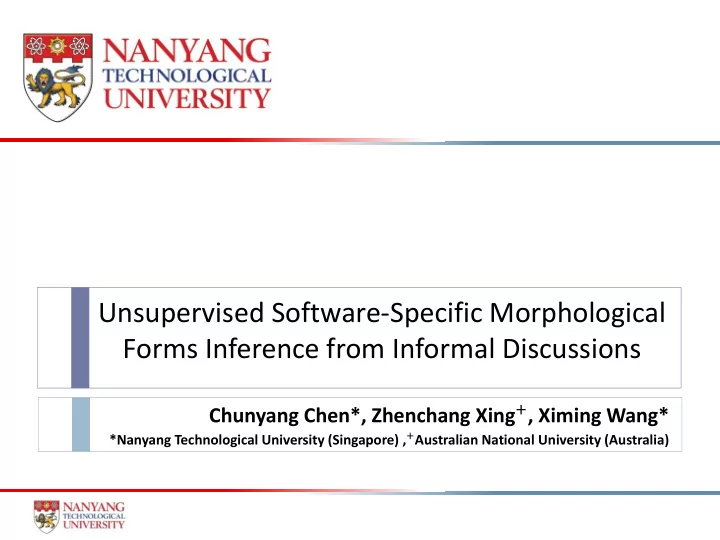

Unsupervised Software-Specific Morphological Forms Inference from Informal Discussions Chunyang Chen*, Zhenchang Xing + , Ximing Wang* *Nanyang Technological University (Singapore) , + Australian National University (Australia)
Background Informal discussions on social platforms are accumulated into a large body of programming knowledge in natural language text.
Background The “ beauty ” of natural language is its dynamic: E.g., the same concept is often intentionally or accidentally mentioned in many different morphological forms in informal discussions.
Background Morphological forms of one word: Abbreviations Synonyms Misspellings
Motivation The “beauty” can also be a nightmare for machine! Problems brought by those morphological forms: Lexical gap in information retrieval Word sparsity in data analysis Inconsistent vocabulary for NLP related tasks
Motivation Natural Language Processing: Software-specific domain: Domain-specific Thesaurus It groups English words into An (semi)automatic method sets of synonyms called synsets. without much manual efforts. Problems: Easy to update big human efforts Consider domain-specific The database is fixed, easy to be information out of date. few software-specific terms
Challenge To spot morphological word forms, traditional methods heavily rely on the lexical similarity of words. However, they may misclassify ( opencv , opencsv ) as synonyms, while ( ie , view ) as abbreviations.
Overall approach Incorporate both semantic and lexical information; Large-scale unsupervised approach.
1. Preprocessing Dataset Stack Overflow: 10M questions & 16.5M answers Wikipedia: 5M articles Text cleaning Remove HTML tags, lowercase and tokenize words Phrase Detection E.g., visual studio, sql server, quick sort Find bigram phrases that appear frequently enough in the text compared with the frequency of each unigram. Repeat that process to find longer phrases.
2. Building Software-Specific Vocabulary Dataset: Stack Overflow: software-specific Wikipedia: general (almost including all-domain knowledge) Identify software-specific terms by contrasting the term frequency of a term in the software specific corpus compared with its frequency in the general corpus: 𝑑𝑒(𝑢) 𝑞 𝑒 (𝑢) 𝑂𝑒 domainSpecificity(t) = 𝑞 (𝑢) = 𝑑(𝑢) 𝑂 𝑞 𝑦 (𝑢) is the probability of the term 𝑢 in corpus 𝑦 and 𝑑 𝑦 (𝑢) is the count of 𝑢 in corpus 𝑦 .
3 & 4. Extracting Semantically Related Terms Split the whole Stack Overflow into 11 small bulks; Train one word2vec model on one bulk; For each domain-specific term, get its top 20 semantic related words in each model; Merge and rerank candidates from different bucks into one list. Candidates: Synonyms & abbreviations Similar terms
5. Discriminating Synonyms & Abbreviations Discriminating Morphological Synonyms Damerau-Levenshtein distance 𝐸𝑀𝑒𝑗𝑡𝑢𝑏𝑜𝑑𝑓(𝑢,𝑥) similaritymorph(t, w) = 1 − 𝑛𝑏𝑦(𝑚𝑓𝑜(𝑢); 𝑚𝑓𝑜(𝑥)) Discriminating Abbreviations The characters of the abbreviation must be in the same order as they appear in the term; The length of the abbreviation must be shorter than that of the term; If there are digits in the abbreviation, there must be the same digits in the term; …
6. Grouping Morphological Synonyms Existing synonyms are separated and overlapped. timeout: timeouts, timout, time out; timed out: timed-out, times out, time out Build a graph of morphological synonyms All existing pairs of synonyms are regarded edges for the graph Take all terms in a connected component as mutual synonyms
SEthesaurus 52,645 software-specific terms, 4,773 abbreviations for 4,234 terms, 14,006 synonym groups containing 38,104 morphological terms.
Evaluation The coverage of software-specific vocabulary Abbreviation coverage Synonym coverage Human evaluation of the accuracy
The Coverage of Software-Specific Vocabulary Ground truth A tag (in Stack Overflow and Code Project) is a word or phrase that describes the topic of the question. All tags are software-specific terms. Results Our thesaurus contains 70.1 % tags in Stack Overflow 79.2 % tags in Code Project
Abbreviation & Synonym Coverage Abbreviation coverage Ground truth: 1,292 abbreviations of computing and IT in Wikipedia Result: 86% of them are covered in our thesaurus. Synonym coverage Ground truth: 3,231 synonym pairs of tags in Stack Overflow are community created and approved. Result:
Human Evaluation of Accuracy Experiment 3 final-year undergraduate and 1 RA with master degree Randomly sample 400 synonym pairs and 200 abbreviation pairs for evaluation Result 74.3 % abbreviation pairs are correct 85.8 % synonym pairs are correct
Usefulness Evaluation Experiment Normalize software-specific questions and corresponding tags with our thesaurus. Investigate how much the text normalization can make question content more consistent with its metadata (i.e., tags). Randomly sample 100K questions from Stack Overflow and 50K questions from CodeProject 0.9 Result 0.79 0.8 0.68 0.68 0.7 0.61 0.55 0.6 0.53 Tag Coverage No Normalization 0.51 0.48 0.5 Porter Stemming 0.4 WordNet Lemmatization 0.3 SEthesaurus 0.2 0.1 0.0 Stack Overflow CodeProject
Tool Website https://se-thesaurus.appspot.com/ API https://se-thesaurus.appspot.com/api
Ongoing Application Spell checking General spell-checker is not suitable for software-specific text Find tag synonyms Propose 917 tag synonym pairs in Stack Overflow. Get 61 upvotes and 8 favorites in two days. https://meta.stackoverflow.com/questions/342097
Ongoing Application IR & text preprocessing Manually check the accurate synonyms & abbreviation, more than 3K groups so far. https://se-thesaurus.appspot.com/synonymAbbreviation_manualCheck.txt Used to normalize software-specific text
Chen, Chunyang, Zhenchang Xing, and Ximing Wang. "Unsupervised software-specific morphological • forms inference from informal discussions." In Proceedings of the 39th International Conference on Software Engineering , pp. 450-461. IEEE Press, 2017. Chen, Xiang, Chunyang Chen, Dun Zhang, and Zhenchang Xing. "SEthesaurus: WordNet in Software • Engineering." IEEE Transactions on Software Engineering (2019). Thanks for listening, questions? Chunyang Chen*, Zhenchang Xing + , Ximing Wang* *Nanyang Technological University (Singapore) , + Australian National University (Australia)
Recommend
More recommend